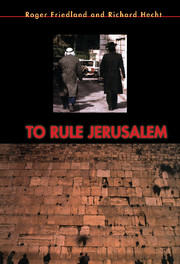Book contents
- Frontmatter
- Contents
- List of Illustrations
- Preface
- Acknowledgments
- Introduction
- 1 A Fearful Fusion
- Part I The Two Zions: Jews Against Zionism in Jerusalem
- Part II Zion Divine: Jerusalem as the Messianic Central City
- 6 A Few Footsteps for the Messiah
- 7 Staking the Claim in Judea and Samaria
- 8 Building the Capital
- 9 Suburbs of the Messiah
- 10 Defensible Borders
- Part III Birth of a Nation
- Part IV Heart of Stone
- Notes
- Index
9 - Suburbs of the Messiah
Published online by Cambridge University Press: 13 May 2010
- Frontmatter
- Contents
- List of Illustrations
- Preface
- Acknowledgments
- Introduction
- 1 A Fearful Fusion
- Part I The Two Zions: Jews Against Zionism in Jerusalem
- Part II Zion Divine: Jerusalem as the Messianic Central City
- 6 A Few Footsteps for the Messiah
- 7 Staking the Claim in Judea and Samaria
- 8 Building the Capital
- 9 Suburbs of the Messiah
- 10 Defensible Borders
- Part III Birth of a Nation
- Part IV Heart of Stone
- Notes
- Index
Summary
The Gush Emunim, or “Bloc of the Faithful,” dedicated to populating the land of Israel, moved outward from Jerusalem and Tel Aviv. The success of this settlement movement lay in its ability to recast Israel's foundational myths religiously. Gush Emunim claimed to reincarnate the hero of Israeli history – the pioneer – and to be the vital, expansive successor to the kibbutz settlements they founded. For decades, the religious Zionists, who had a kibbutz movement of their own, had been looked down on by the Labour Zionists as not measuring up to the ideal of the new Israeli, somehow tainted by their continued attachment to Torah, holding to traditions of exile. As the religious nationalist movement grew and held tenaciously to one place after another, the settlers’ claim that they were the true embodiment of the Zionist settlement did not go unheeded.
The Ancien Regime
The pious Jewish families who have braved Palestinian violence and the hostility of their own government to live in Jerusalem's remote suburbs see themselves as the natural heirs of the pioneers who endured considerable hardship and broke British law in the prestate years to carve out a place Jews could call their own. Religious nationalist Jews led the drive to resettle Judea and Samaria; secular Jews who shared their territorial objectives followed their lead.
Eliakim Ha-Etzni was a party leader and polemicist for Tehiyah, the political party established in 1979 with the support of Rabbi Zvi Yehuda Kook, in response to Begin's signing of the Camp David Accords granting Palestinian autonomy in Judea and Samaria. Tehiyah was intended to unite all those, religious and secular, who were most zealous about the land.
- Type
- Chapter
- Information
- To Rule Jerusalem , pp. 200 - 212Publisher: Cambridge University PressPrint publication year: 1996

